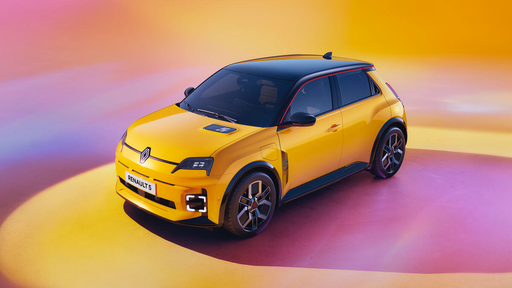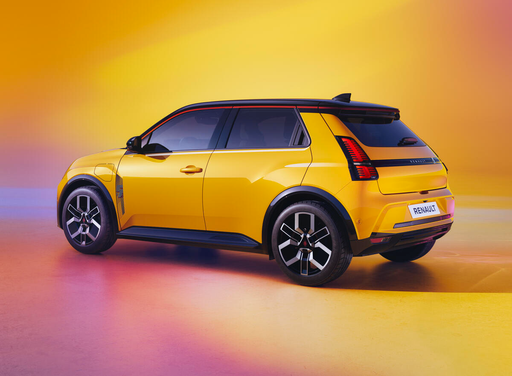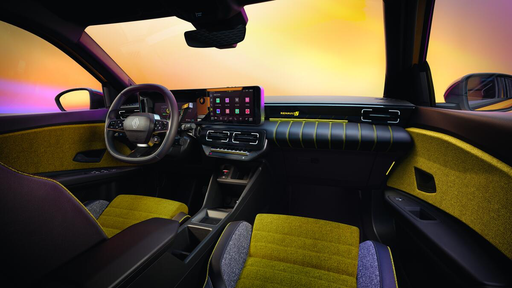Nissan Interstar VS Renault R5 – Specs, Efficiency & Price Comparison
Which model is the better choice – the Nissan Interstar or the Renault R5? We compare performance (180 HP vs 150 HP), boot capacity ( vs 326 L), efficiency (7.40 L vs 14.80 kWh), and of course, the price (33300 £ vs 21300 £).
Find out now which car fits your needs better!
The Nissan Interstar (Cargo Van) is powered by a Diesel or Electric engine and comes with a Manuel or Automatic transmission. In comparison, the Renault R5 (Hatchback) features a Electric engine and a Automatic gearbox.
When it comes to boot capacity, the Nissan Interstar offers , while the Renault R5 provides 326 L – depending on what matters most to you. If you’re looking for more power, you’ll need to decide whether the 180 HP of the Nissan Interstar or the 150 HP of the Renault R5 suits your needs better.
There are also differences in efficiency: 7.40 L vs 14.80 kWh. In terms of price, the Nissan Interstar starts at 33300 £, while the Renault R5 is available from 21300 £.
Compare all the key specs now and find out which model fits your lifestyle best!
Nissan Interstar
The Nissan Interstar is a versatile van that expertly combines practicality with modern design. It offers a spacious interior that caters to both cargo and passenger needs, making it ideal for businesses and families alike. With its robust performance and efficient fuel consumption, the Interstar stands out as a reliable choice in the commercial vehicle market.
detailsRenault R5
The Renault R5 is a classic hatchback that captured the imagination of drivers with its distinctive design and compact versatility. Its agile handling and efficient performance made it a popular choice in urban settings and winding country roads alike. With a blend of style and practicality, the Renault R5 remains a beloved icon in automotive history.
details @ media.renault.at
@ media.renault.at
 @ media.renault.at
@ media.renault.at
 @ media.renault.at
@ media.renault.at

|
|
|
|
|
Costs and Consumption |
|
|---|---|
|
Price
33300 - 54400 £
|
Price
21300 - 29500 £
|
|
Consumption L/100km
7.4 - 7.5 L
|
Consumption L/100km
-
|
|
Consumption kWh/100km
-
|
Consumption kWh/100km
14.80 kWh
|
|
Electric Range
400 km
|
Electric Range
300 - 405 km
|
|
Battery Capacity
-
|
Battery Capacity
40 kWh
|
|
co2
0 - 195 g/km
|
co2
0 g/km
|
|
Fuel tank capacity
80 - 105 L
|
Fuel tank capacity
-
|
Dimensions and Body |
|
|---|---|
|
Body Type
Cargo Van
|
Body Type
Hatchback
|
|
Seats
3 - 7
|
Seats
5
|
|
Doors
4
|
Doors
5
|
|
Curb weight
1927 - 2538 kg
|
Curb weight
1447 - 1524 kg
|
|
Trunk capacity
-
|
Trunk capacity
326 L
|
|
Length
5048 - 6848 mm
|
Length
3922 mm
|
|
Width
2070 - 2222 mm
|
Width
1744 mm
|
|
Height
2307 - 2808 mm
|
Height
1498 mm
|
|
Payload
845 - 1451 kg
|
Payload
396 - 418 kg
|
Engine and Performance |
|
|---|---|
|
Engine Type
Diesel, Electric
|
Engine Type
Electric
|
|
Transmission
Manuel, Automatic
|
Transmission
Automatic
|
|
Transmission Detail
Manual Gearbox, Automatic Gearbox, Automated Manual, Reduction Gearbox
|
Transmission Detail
Reduction Gearbox
|
|
Drive Type
Front-Wheel Drive, Rear-Wheel Drive
|
Drive Type
Front-Wheel Drive
|
|
Power HP
105 - 180 HP
|
Power HP
95 - 150 HP
|
|
Acceleration 0-100km/h
-
|
Acceleration 0-100km/h
8 - 9 s
|
|
Max Speed
120 - 177 km/h
|
Max Speed
150 km/h
|
|
Torque
300 - 400 Nm
|
Torque
215 - 245 Nm
|
|
Number of Cylinders
4
|
Number of Cylinders
-
|
|
Power kW
77 - 132 kW
|
Power kW
70 - 110 kW
|
|
Engine capacity
1997 - 2299 cm3
|
Engine capacity
-
|
General |
|
|---|---|
|
Model Year
2021 - 2024
|
Model Year
2025
|
|
CO2 Efficiency Class
G, A
|
CO2 Efficiency Class
A
|
|
Brand
Nissan
|
Brand
Renault
|
Nissan Interstar
The Evolution of the Nissan Interstar
The Nissan Interstar has long been a staple in the commercial vehicle sector, known for its robust build and practical design. The latest iterations have further cemented its status with a range of technical enhancements and innovative features aimed at aiding businesses in achieving optimal efficiency. Whether you're navigating city streets or traversing the highways, the Interstar stands out as a reliable workhorse ready to meet various transport needs.
Power and Performance
The current range of Nissan Interstar models boasts diesel engines ranging from 105 to 180 PS, offering a commendable blend of power and fuel efficiency across the board. With a fuel consumption of between 7.4 and 7.5 litres per 100 kilometres, these vehicles are designed to minimise operational costs while maximizing performance.
All models feature four-cylinder engines, with engine displacement between 1997 and 2299 cm³, capable of producing torque figures between 330 and 400 Nm. These specifications ensure that the Interstar offers superior pulling power, which is particularly useful for transporting heavy loads across different terrains.
Transmission and Drive Options
Versatility is at the heart of the Nissan Interstar, with transmission options including both manual and automatic gearboxes. Drivers can also choose between front-wheel and rear-wheel drive configurations, allowing the vehicle to suit specific logistical requirements or personal preferences.
For those seeking simplicity and ease of use in urban environments, the Interstar with its automated gearshift provides a smooth driving experience, reducing driver fatigue and increasing focus on the road ahead.
Dimensions and Load Capacities
The Nissan Interstar is available in various lengths, from 5048 mm to an extensive 6848 mm, catering to diverse commercial needs. With widths ranging from 2070 mm to 2222 mm and heights from 2307 mm to 2808 mm, the Interstar offers multiple configurations to maximise cargo space and accommodate various loads.
With a maximum payload capacity of up to 1451 kg, businesses can rest assured that the Interstar is more than capable of delivering goods efficiently without compromising on safety or comfort.
Innovation and Technological Features
While functionality remains a priority, Nissan has not skimped on technological advancements. Among the innovations included are advanced safety features, such as anti-lock braking systems (ABS), electronic stability control (ESC), and a variety of sensors to assist with parking and reversing.
In terms of driver comfort, the brand offers multiple trim levels with exceptional interior features designed to enhance driver experience during long hauls. Options such as climate control, advanced navigation systems, and modern infotainment setups are available, ensuring that both driver and passenger remain comfortable and connected, regardless of the journey length.
Coachwork and Trim Options
The Interstar line-up provides a range of trim levels and equipment lines, from the entry-level Visia to the high-spec Tekna, catering to different market demands and individual preferences. The selection allows buyers to prioritise features that best suit their operation or driving style.
For example, the N-CONNECTA variant offers an array of added extras, enhancing both connectivity and comfort for drivers who rely on the vehicle as a mobile office.
Conclusion
The Nissan Interstar represents a harmonious blend of power, efficiency, and technological innovation in the large van segment. With its vast array of options and features, the Interstar is undeniably a top choice for businesses looking to invest in a dependable and adaptable commercial vehicle. As the line-up continues to evolve, the Interstar remains poised to meet the growing challenges and demands of the modern logistic landscape.
Renault R5
The Renault R5: A Revolutionary Return
The iconic Renault R5 is back and it's more innovative than ever. The latest iterations of the R5 bring a fresh spin on the beloved classic, complete with cutting-edge technology and sustainable performance. Modernised for the contemporary driver, it retains its characteristic charm while integrating state-of-the-art electric capabilities.
Tech-Savvy and Environmentally Friendly
Gone are the days of petrol engines, as the new Renault R5 embraces a fully electric motor system. Available in two power variants, you can choose between a 95 PS or 150 PS output, catering to both urban commuters and those seeking a more spirited drive. With zero CO2 emissions, the R5 embodies Renault's commitment to sustainability and environmental responsibility.
Acceleration and Performance
The Renault R5 can accelerate from 0 to 100 km/h in just 8 seconds — an impressive feat for an electric hatchback. This agile performance is matched by a maximum speed of 150 km/h, ensuring that drivers won’t have to compromise on excitement and speed while adhering to eco-friendly practices.
Range and Efficiency
Featuring two battery options, the R5 offers varying ranges to suit different lifestyles. The Comfort Range sports a 52 kWh battery, promising up to 405 km on a single charge, while the Urban Range, with a 40 kWh battery, offers a respectable 300 km. These options provide flexibility depending on driving habits and needs.
Design and Practicality
Retaining its iconic hatchback silhouette, the Renault R5 measures 3,922 mm in length, 1,744 mm in width, and 1,498 mm in height. Its compact design is perfectly suited for urban environments, while the 326-litre boot ensures ample storage for everyday use. The five-door configuration provides easy access for passengers and cargo alike.
Cost and Value
Starting from €24,900, the Renault R5 offers exceptional value for an electric vehicle with its level of performance and technology. The range-topping models can go up to €34,400, with each variant providing an attractive balance of features and cost. Additionally, with multiple trim lines like "Iconic Five," "Techno," and "Five," there is a perfect R5 for every driver.
Conclusion: Driving the Future
With its striking blend of nostalgic design and futuristic technology, the Renault R5 is aptly poised to inspire a new generation of eco-conscious drivers. It's a testament to how classic designs can evolve without losing their soul, positioning the R5 not just as a car of the past, but a pioneer of tomorrow.
The prices and data displayed are estimates based on German list prices and may vary by country. This information is not legally binding.
